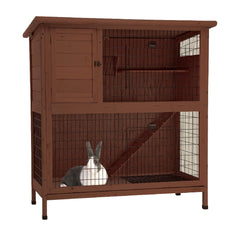
Are you considering adding a furry friend to your family? Look no further than the benefits of owing a pet rabbit! These adorable small animals make great companions and can bring endless joy to your home. But with so many rabbit breeds out there, how do you find the perfect one for you? In this ultimate guide, we'll walk you through the process of finding a pet rabbit for sale and help you choose the right one that fits your lifestyle and preferences.
From finding a reputable rabbit breeder to understanding the different rabbit breeds, we'll cover it all. Whether you're looking for a small and cuddly rabbit or a larger, more active one, we'll provide you with all the information you need to make an informed decision. We'll also discuss important considerations such as the rabbit's temperament, lifespan, and dietary needs.
So, if you're ready to embark on the exciting journey of finding your perfect pet rabbit, let's dive in and make sure you bring home a new furry friend who will become a cherished member of your family.
Benefits of owning a pet rabbit
Owning a pet rabbit comes with a wide range of benefits. Firstly, rabbits are known for their gentle and friendly nature, making them perfect for families with older children or individuals looking for a loving companion. Additionally, rabbits are highly intelligent creatures that can be trained to use a litter box and perform simple tricks, adding an element of entertainment to your daily life.
Furthermore, rabbits are relatively low-maintenance pets compared to other animals. They don't require daily walks like dogs and are perfectly content with a spacious indoor or outdoor enclosure. Rabbits also have a longer lifespan compared to smaller pets, with some breeds living up to 10 years or more.
When it comes to allergies, rabbits are generally hypoallergenic, making them a suitable choice for individuals who may be sensitive to other animals. Their fur doesn't contain the same allergenic proteins found in cats or dogs, reducing the risk of allergic reactions.
Overall, owning a pet rabbit can bring immense joy and companionship into your life while requiring less effort and maintenance compared to other pets.
Considerations before getting a pet rabbit
 Before you bring home a pet rabbit, it's essential to consider a few factors to ensure you can provide a suitable environment and care for your new furry friend.
Before you bring home a pet rabbit, it's essential to consider a few factors to ensure you can provide a suitable environment and care for your new furry friend.
Firstly, rabbits need ample space to roam and exercise. It's recommended to have a minimum of 1-2 square metros of living space per rabbit. This can be achieved through a combination of a large multi-story hutch and supervised free-roaming time in a safe and bunny-proofed area of your home.
 Additionally, rabbits are social animals and thrive on companionship. Consider getting a pair of rabbits if you can provide adequate space and attention. However, if you choose to have a single rabbit, be prepared to spend plenty of time interacting and bonding with your pet.
Additionally, rabbits are social animals and thrive on companionship. Consider getting a pair of rabbits if you can provide adequate space and attention. However, if you choose to have a single rabbit, be prepared to spend plenty of time interacting and bonding with your pet.
It's also important to note that rabbits have specific dietary needs. Their diet should consist mainly of hay, fresh vegetables, and rabbit pellets. Avoid feeding them human food or treats that are high in sugar, as this can lead to digestive problems and obesity.
Lastly, rabbits require regular grooming to maintain a healthy coat and prevent hairballs. Long-haired breeds, in particular, may need daily brushing to prevent matting. Ensure you have the time and commitment to provide proper grooming and care for your rabbit before bringing one home.
Different rabbit breeds
Rabbits come in a variety of shapes, sizes, and coat types, each with its unique characteristics and traits. Understanding the different rabbit breeds can help you choose the right one that aligns with your preferences and lifestyle.
1. Dutch Rabbit: The Dutch rabbit is known for its distinctive color pattern of a white blaze on the nose, a white collar, and a colored body. They are medium-sized rabbits with a friendly and outgoing personality, making them suitable for families.
2. Lop Rabbit: Lop rabbits are characterised by their drooping ears, which can either be short (Mini Lop) or long (English Lop). They are known for their docile nature and make excellent companions for older children and individuals looking for a cuddly pet.
3. Rex Rabbit: The Rex rabbit stands out for its plush and velvety coat that comes in various colours. They have a calm and gentle temperament, making them great for families with children. Rex rabbits are also relatively low-maintenance in terms of grooming.
4. Flemish Giant: If you're looking for a larger rabbit breed, the Flemish Giant is worth considering. They are one of the largest rabbit breeds, known for their friendly and laid-back nature. Due to their size, they require more space and a sturdy enclosure.
5. Netherland Dwarf: The Netherland Dwarf is one of the smallest rabbit breeds, making them ideal for individuals with limited space. Despite their size, they have a lively and playful personality. It's important to note that Netherland Dwarfs may require extra care and attention due to their small size and susceptibility to health issues.
These are just a few examples of the many rabbit breeds available. Researching different breeds and their specific characteristics can help you find the perfect rabbit that matches your preferences. Our knowledgeable staff can advise you on what breed will best suit your individual circumstances.
Where to find pet rabbits for sale
When searching for a pet rabbit for sale, it's crucial to find a well known supplier, that has healthy livestock. All our rabbits for sale come with a health guarantee.
We have Mini Lop rabbits & Dwarf Lop rabbits for sale in the store. As these are a popular pet, we recommend contacting us regarding availability on, 48621175.
However, taking care of these furry friends requires some knowledge and dedication. We have put together this comprehensive guide to help you provide the best care for your Mini Lop rabbit. Find our Mini Lop Rabbits: A Comprehensive Guide to Caring for Them here!
How to choose the right pet rabbit
Choosing the right pet rabbit involves considering various factors, including your lifestyle, space availability, and personal preferences.
Firstly, consider the size of the rabbit. Smaller breeds like the Netherland Dwarf or Mini Lop are better suited for individuals with limited space, while larger breeds like the Flemish Giant require more room to roam.
Next, evaluate your activity level and the amount of time you can dedicate to your rabbit. Some breeds are more active and require regular exercise and mental stimulation, while others are more laid-back. If you're an active individual, a breed like the Dutch rabbit may be a good fit.
Temperament is another important consideration. While most rabbit breeds are generally friendly and gentle, individual rabbits may have their unique personalities. Spend time interacting with different rabbits to get a sense of their temperament and compatibility with your family.
Lastly, consider your preferences regarding coat type and color. Some people may prefer long-haired breeds like the English Lop, while others may prefer the sleek coat of a Rex rabbit. Choose a rabbit with a coat type and color that resonates with you.
By taking these factors into account, you can find a pet rabbit that suits your lifestyle and preferences, ensuring a harmonious and fulfilling relationship.
Tips for caring for a pet rabbit
Once you bring your pet rabbit home, it's essential to provide proper care to ensure their well-being and happiness.
ensure their well-being and happiness.
Firstly, create a safe and comfortable living space for your rabbit. This includes providing a spacious enclosure with plenty of room to hop and play, as well as toys and tunnels for mental stimulation. Ensure the enclosure is escape-proof and free from hazards such as toxic plants or electrical cords.
Next, establish a consistent feeding routine. The majority of a rabbit's diet should consist of high-quality hay, which aids in digestion and promotes dental health. Fresh vegetables and a small portion of pellets can also be included in their diet. Avoid overfeeding or providing an imbalanced diet, as this can lead to obesity or other health issues.
Regular exercise is crucial for a rabbit's physical and mental well-being. Allow your rabbit supervised free-roaming time outside their enclosure, ensuring the area is bunny-proofed and safe. Additionally, provide toys and interactive activities to keep your rabbit entertained and prevent boredom.
Grooming is another important aspect of rabbit care. Brush your rabbit's fur regularly, especially if they have a long coat, to prevent matting and hairballs. Trim their nails regularly and check their ears and teeth for any signs of issues.
Lastly, ensure your rabbit receives regular veterinary check-ups and vaccinations. Rabbits are susceptible to certain health issues, and early detection can prevent complications. Consult with a rabbit-savvy veterinarian for guidance on vaccinations and preventative care.
Learn more about what to do when you first arrive home with your new pet rabbit here - The Ultimate Guide to Bringing Home a New Pet Rabbit.
Common health issues and how to prevent them
While rabbits are generally hardy animals, they can still be prone to certain health issues. Being aware of these common problems and taking preventative measures can help keep your rabbit healthy and happy.
One common health issue in rabbits is dental problems. Rabbit teeth continuously grow, and if not properly worn down through chewing, they can cause dental malocclusion or overgrowth. Learn more here about dental care for pet rabbits- Why Rabbit Dental Care is Important and How to Do It Right.
Providing a diet rich in hay and appropriate chewing toys can help prevent dental issues. Learn more here about the importance of hay in your rabbits diet - The Essential Role of Hay and Fibre in the Health of Rabbits and Guinea Pigs.
Another health concern is gastrointestinal stasis, also known as a gut stasis. This condition occurs when a rabbit's digestive system slows down or stops functioning. Feeding a high-fiber diet, ensuring adequate hydration, and providing regular exercise can help prevent gut stasis.
Rabbits are also susceptible to parasites such as fleas, ticks, and mites. Regular grooming, keeping their living area clean, and using appropriate parasite prevention products can help keep these pests at bay.
Additionally, rabbits can develop respiratory infections, especially when exposed to drafts or poor air quality. Ensure your rabbit's living area is well-ventilated, clean, and free from irritants.
Regular veterinary check-ups, a balanced diet, and a clean living environment are key to preventing common health issues in rabbits. If you notice any signs of illness or behavior changes in your rabbit, consult with a veterinarian promptly.
Finding your perfect pet rabbit
Bringing a pet rabbit into your life can be a rewarding and fulfilling experience. By considering the different rabbit breeds, finding a reputable source, and understanding their specific needs, you can find the perfect pet rabbit that fits your lifestyle and preferences.
Remember to provide a safe and comfortable living space, a balanced diet, regular exercise, and proper grooming for your rabbit's well-being. Stay vigilant for any signs of health issues and consult with a rabbit-savvy veterinarian for guidance.
With the right care and attention, your pet rabbit will become a cherished member of your family, providing endless joy and companionship for years to come. So, embark on this exciting journey, and find your perfect pet rabbit today!
© weknowpets 2023






